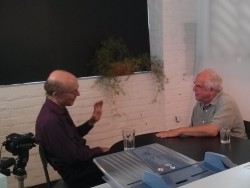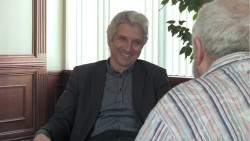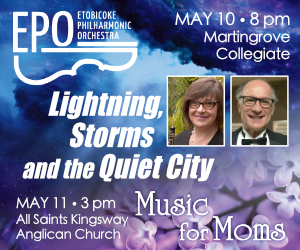With repatriation of our “studio” facilities and means of production to our own office at the Centre for Social Innovation, 720 Bathurst, our Conversations <at> The WholeNote video series looks set to gather steam heading into the 2014/15 season.
 During September, publisher David Perlman continued his series of conversations with Toronto’s musical players with a wide-ranging interview with Noel Edison, conductor of the Toronto Mendelssohn Choir and the Elora Festival Singers, and artistic director of the Elora Festival. Fresh from the Mendelssohn’s second rehearsal of a very busy new season, Edison spoke of the choir’s new blood and the rigorous audition process involved in adding it, of the juggling act to keep his organizations in sync and the ingenuity needed to stoke the flames of budgets approaching one million dollars a year.
During September, publisher David Perlman continued his series of conversations with Toronto’s musical players with a wide-ranging interview with Noel Edison, conductor of the Toronto Mendelssohn Choir and the Elora Festival Singers, and artistic director of the Elora Festival. Fresh from the Mendelssohn’s second rehearsal of a very busy new season, Edison spoke of the choir’s new blood and the rigorous audition process involved in adding it, of the juggling act to keep his organizations in sync and the ingenuity needed to stoke the flames of budgets approaching one million dollars a year.
It was also fascinating to hear him speak of the connection his mother had to the Mendelssohn in the 1950s. (She was in the soprano section.) Because of his parents’ friendship with the MacMillans (“Lady Mac and Sir Ernest”), they used to host the post-Messiah parties at their house in Rosedale, all-night affairs since in those days Messiah would start at eight and end five hours later. “Oh you know, those tempos in the 1950s,” Edison recounted. “I mean, ‘Comfort ye in every valley’ took close to 15 minutes!”
And detailing the audition process: “I don’t hear them sing until they get through a really tough rhythmic audition first and once that’s done, if they pass that with flying colours, then I’ll listen to the voice. But the rhythm has to be first and foremost. And it’s proved to be very successful.”
Edison spoke effusively about the sound of the choir: “It’s a very different sound now. It’s a far warmer tone – to me. It’s the tone I love. I love that warmth, I love that rich sort of Mahlerian, chocolatey sound. That’s the sound I very much express with.”
For an unforgettable anecdote involving a party at Edison’s own Elora home and countertenor Daniel Taylor’s singing of Lois Marshall’s signature folk song “Ae Fond Kiss,” watch the full interview with Edison on The WholeNote’s YouTube channel. (You can access the channel directly from our website by clicking on “Our Videos” under the News tab.)
The interview with Edison is only one of dozens you will find there. The most recent before the Edison finds publisher Perlman in conversation with David Fallis, artistic director of the Toronto Consort.
 Fallis’ enthusiasm is contagious as he outlines a brief history of the Consort and his own involvement with the group – he joined in 1979; the Consort began in 1972. After a few words on the nature of consort music – “what’s on the page is very much just the beginning of the beginning” – he moves on to Renaissance singing. He points out that a vocal treatise (on how to sing) was basically a compendium of ornaments, “which is to say you can’t be a singer if you can’t ornament.” He discloses how each Toronto Consort concert season is constructed, using the current year as an example, including The Play of Daniel, “the pinnacle of medieval music theatre,” and likely the high point of what promises to be an engaging season.
Fallis’ enthusiasm is contagious as he outlines a brief history of the Consort and his own involvement with the group – he joined in 1979; the Consort began in 1972. After a few words on the nature of consort music – “what’s on the page is very much just the beginning of the beginning” – he moves on to Renaissance singing. He points out that a vocal treatise (on how to sing) was basically a compendium of ornaments, “which is to say you can’t be a singer if you can’t ornament.” He discloses how each Toronto Consort concert season is constructed, using the current year as an example, including The Play of Daniel, “the pinnacle of medieval music theatre,” and likely the high point of what promises to be an engaging season.
He twinkles especially as he speaks of “Paris Confidential” the opening concert of the new season November 7 and 8. It was designed by Alison McKay (his wife) “who is a wizard at designing programs with imagery and spoken word and music and weaving them in fascinating ways.” It plunges right into Renaissance Paris roughly in the 16th century, which he points out, was a very critical time in the development of both the city and early modern France itself. Paris then was an intellectual centre and a hub for the new technology of publishing with very important printers. He compared the fact that lute music was written in tablature to apps today. Then as now, figuring out how to make the best use of new technology was key.
The three years of Conversations <at> TheWholeNote are becoming an interesting archive of insights into a whole range of people, caught at a particular moment in time. While the interviews may rapidly lose the topicality of the specific moment that was the reason for the visit, it’s especially diverting to revisit them when the subjects are back in town. Wallis Giunta, for example, has been the subject of two conversations in the past two and a half years. From October 23 to November 1 she’s singing the role of Bradamante in Opera Atelier’s production of Handel’s Alcina. And it’s instructive to see Jan Lisiecki’s poise in his conversation a few days before he turned 17, given that in November he will be back playing Beethoven’s Piano Concertos 3, 4, and 5 with the TSO.
 And as for Peter Oundjian, the TSO’s peripatetic music director, Conversations <at> TheWholeNote caught up to him just two months before the orchestra’s recent European tour, the outcome of which, you can read about in William Littler’s article “Waving the Musical Flag,” elsewhere in this issue.
And as for Peter Oundjian, the TSO’s peripatetic music director, Conversations <at> TheWholeNote caught up to him just two months before the orchestra’s recent European tour, the outcome of which, you can read about in William Littler’s article “Waving the Musical Flag,” elsewhere in this issue.
Among others captured in these conversations, and active in this month’s concert scene: Amici Ensemble’s Serouj Kradjian, soon after joining the group; new music champion, pianist Christina Petrowska Quilico; and Stephen Ralls (interviewed here with Aldeburgh Connection partner Bruce Ubukata before their final season gala concert).
Like the magazine itself, the series is a work in progress, always putting substance before style. Like the magazine, it is also a priceless archive-in-the-making.
Paul Ennis is managing editor of The WholeNote.



